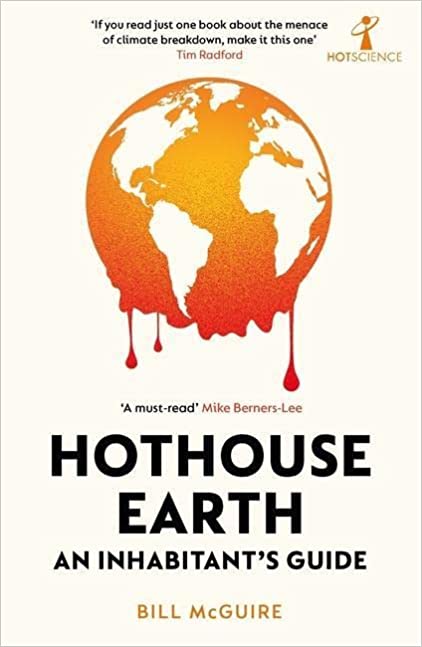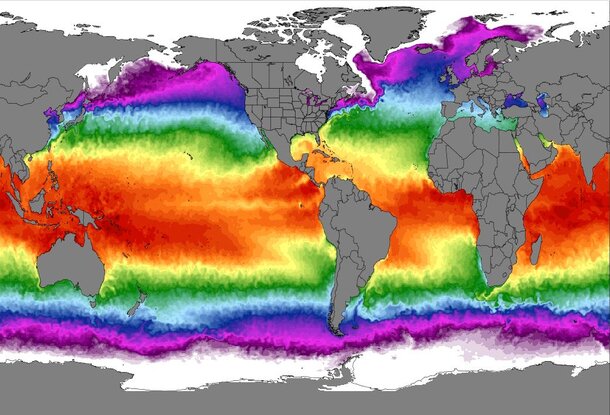As the latest data reveals global average sea surface temperatures hitting a record high, Prof Bill McGuire explains why he wrote his uncompromising bestseller, Hothouse Earth
If you want a book about the grim future we will face as global heating bites ever harder to make a splash, then try and coincide its publication with the highest temperatures ever recorded.
Clearly, without a crystal ball or an especially accurate long-term weather forecast, this isn’t easy. Nonetheless, this is something I managed – as perverse luck would have it – with my latest book, Hothouse Earth: an Inhabitant’s Guide, which was launched during the blistering heatwave that roasted the UK and much of Europe in July and August 2022. The timing was a gift to marketing, resulting as it did in considerable exposure, leading to the book reaching number seven in the Amazon UK rankings. For me, personally, this meant that writing Hothouse earth had been worth all the effort and not a little angst.

Having been invited by Icon Books, in early 2021, to write a climate change book, I had been thinking long and hard about what I wanted to say, because I was taking an angle that I knew might not be popular, and which some would inevitably call out as alarmist. The book’s principal message is that it is now practicably impossible for us to avoid a 1.5°C global average temperature rise (since pre-industrial times), a threshold typically equated with the dangerous climate change ‘guardrail’. Beyond this, climate breakdown will become all-pervasive, affecting everyone on the planet and insinuating itself into every aspect of our lives.
It was the Glasgow COP26 climate conference in November 2021 that set me thinking along these lines. Attending the event was a frustrating business. All the talk was of staying this side of 1.5°C, when it was perfectly apparent that this wasn’t going to happen. To have any chance, emissions would need to fall by 50 percent or so by 2030, and although possible in theory, in the real world there was no sign of adequate action being taken. The corollary of this is that we will need to adapt to that degree of climate breakdown that is inevitable, while – at the same – time, slashing emissions as rapidly as possible, to prevent things being even worse.
As you might expect – given its central message – Hothouse Earth can be a grim read, setting out as it does the difficult, not to say deadly, conditions we will face in the decades to come, and flagging the inevitably bleak world our children and their children currently stand to inherit.
Never do I encourage the reader to think that all is lost. On the contrary, knowing that hard times are already locked-in makes it even more imperative that we do what’s needed to stop a bleak future becoming even worse
But it is not a book without hope, and never do I encourage the reader to think that all is lost. On the contrary, knowing that hard times are already locked-in makes it even more imperative that we do what’s needed to stop a bleak future becoming even worse. Hothouse Earth, then, is a call to arms, a message to humankind that – even if can no longer stay this side of 1.5°C – every tonne of carbon we prevent being emitted, and every 0.1C rise in temperature we stop, remains critically important, probably even more so.
Given its somewhat contentious stance, I have been buoyed by the overwhelmingly positive response to the book, and the many complimentary reviews. Most of all, I was overjoyed to see a copy poking from the pocket of a Just Stop Oil (JSO) activist being arrested by police at a motorway protest. I am honoured, too, to be able to take the Hothouse Earth message – in the form of expert testimony – to the juries who sit in judgement of those JSO heroes currently awaiting trial.
It seems, however, that the book’s tidings have had little impact in the corridors of power, either in the UK or abroad. Here, the government’s response has been to open a new coal mine and green light a new round of oil and gas exploration. Meanwhile, at COP27 – held late last year in the Egyptian Red Sea resort of Sharm-el-Sheikh – it was heads in the sand time, as the idea of staying this side of 1.5°C continued to be bandied about as if still do-able.
Expect this to the case too at COP28, taking place in the United Arab Emirates at the end of 2023. Already, this meeting has become a farce due to its hijacking by the fossil fuel sector. It beggars belief, but the President of this most critical of climate conferences will be Sultan Al Jaber, chief of the Abu Dhabi National Oil Company. As I said of the appointment in The Guardian recently, it’s like a big tobacco CEO hosting a cancer conference, except this time the health of the whole planet is at stake.
We need to use the bad news to build anger, to galvanise action, and to do whatever it takes
You can be certain that the disingenuous claim, that the 1.5°C limit isn’t dead yet, will be trailed once again. This shouldn’t be a surprise either, especially at this fossil fuel compromised event. Those corporations responsible for sucking oil, gas and coal out of the ground have long used this figure as a get-out-of-jail card to justify inaction on emissions. Continuing to present this temperature threshold as an attainable target provides a convenient fig leaf for business as usual, and provides the polluters with wriggle room that allows them to kick the production cuts can down the road. Extraordinarily, in February 2023, the oil major BP announced record profits at the very same moment that it also downgraded its target to reduce oil and gas production, and hence allowing more climate pollution.
The shelf life of this lie is, however, rapidly coming to an end. As El Niño conditions build in the eastern Pacific later this year and into next, so there will be another big hike in planetary heating. Across the last five years, the global average temperature rise (compared to 1850 – 1900) has itself averaged out at 1.27°C. It would not be a surprise to see this figure exceed 1.4°C and even approach 1.5°C in the next 18 months. Beyond this, the likelihood of the 1.5°C mark being permanently breached within the next nine years is now 50 percent. This will leave fossil fuel corporations, and the governments that support them, with nowhere to hide.
The bottom line is that 1.5°C is dead in the water. As if to underline the point, the latest findings from the US-based National Oceanic and Atmospheric Administration (NOAA) show that the global average sea surface temperature hit a record high of 21.1°C on 1 April.
But let’s not allow this to drive inertia, to bring despondency. Instead, we need to use the bad news to build anger, to galvanise action, and to do whatever it takes to stop a dangerous future becoming a cataclysmic one.
Bill McGuire is a co-director of the New Weather Institute and Professor Emeritus of Geophysical & Climate Hazards at UCL. Hothouse Earth: an Inhabitant’s Guide is published by Icon Books.














